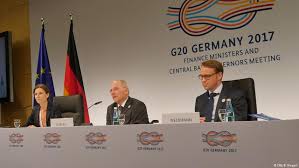A ministerial conference of G20 ministers in charge of digitalisation was held on 6th and 7th April, 2017 in Dusseldorf, Germany. This was the first such meeting of G20 ministers responsible for digitalisation. They have issued a declaration on ‘Shaping Digitalisation for an Interconnected World’, which lays out priorities and course of action.
- The declaration acknowledged that digital economies have the potential to contribute to achieving the goals of the United Nations 2030 Agenda for Sustainable Development.
 For realising this potential, digital economy should be geared towards developing following components:
For realising this potential, digital economy should be geared towards developing following components:
- Broadband connectivity should be available at affordable rates to larger number of people
- Digital literacy and skills should be improved
- Greater push should be provided to digital entrepreneurship
- Adoption of digital technologies and services should be encouraged
MSMEs – Another Core theme of declaration:
The declaration has stated that inclusive growth can be ensured only if MSMEs (Micro, Small and Medium Enterprises) reap the benefits of digital revolution. MSMEs which typically face resource crunch should be supported to embrace digital technologies.
Three annex papers of declaration:
- ‘A Roadmap for Digitalisation: Policies for a Digital Future’
- ‘Digital skills in vocational education and training’
- ‘G20 Priorities on Digital Trade’
These papers envisage collaboration among G20 countries in terms of information and experience sharing, involvement of all stakeholders from public and private domain and defining the scope of digital trade.
G20’s focus on Digital Economy:
During G20 leaders Summit 2016 in Hangzhou, China, the leaders had proposed to collectively tap in opportunities provided by an increasingly digital world and address the ensuing challenges for enabling a dynamic global digital economy that ensures inclusive growth. Since then, digital economy has been placed high on the G20 agenda.
Quick facts about G20:
G20 (Group of Twenty) is a political forum of industrialised and developing economies who deliberate upon range of global and regional issues which affects the global economy. G20 accounts for 85% of Global Gross Domestic Product and 80% of world trade. It represents 66% of the world’s population.
- Formation year: 1999
- Current Members: United States, Argentina, Canada, United Kingdom, Australia, Germany, India, Russia, Italy, China, Japan, Mexico, South Korea, Turkey, Indonesia, Brazil, France, Saudi Arabia, South Africa and European Union




